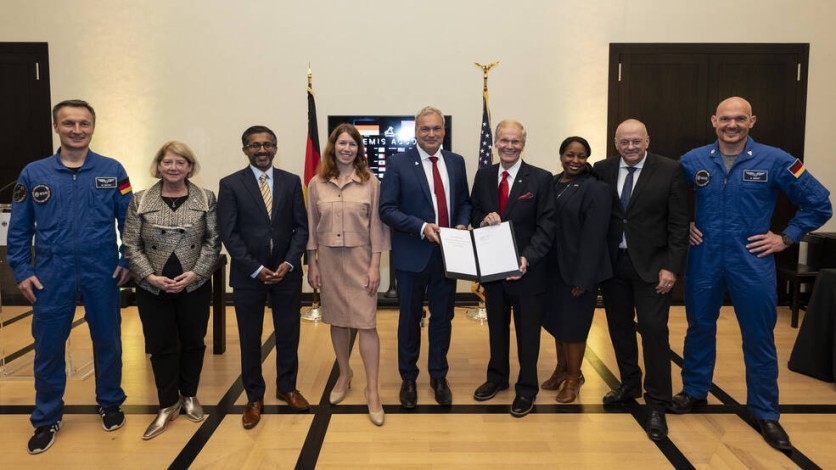Germany has officially joined the NASA-led Artemis Accords, becoming the 29th signatory to the international agreement, with the ultimate goal of expanding space exploration to Mars and beyond.
The signing ceremony took place at the German Ambassador's Residence in Washington, where Dr. Walther Pelzer, Director General of the German Space Agency at DLR, signed on behalf of Germany.

Germany Enters the Artemis Accords
NASA Administrator Bill Nelson and other notable figures were in attendance, including Jennifer Littlejohn from the US Department of State and Andreas Michaelis, the German ambassador to the United States.
Nelson expressed his enthusiasm, saying, "I'm thrilled to welcome Germany to the Artemis Accords family. Germany has long been one of NASA's closest and most capable international partners, and their signing today demonstrates their leadership now and into the future - a future defined by limitless possibilities in space and the promise of goodwill here on Earth."
The Artemis Accords serve as a practical framework for collaboration in space exploration, particularly among nations involved in NASA's Artemis program.
Pelzer emphasized the longstanding successful partnership between Germany and the United States in space endeavors. He highlighted the significant contributions of German companies in the space sector to the Artemis program.
Pelzer noted that the Artemis Accords opened up many new opportunities for industry and scientific research in Germany and Europe. In conjunction with the US Department of State, NASA introduced the Artemis Accords in 2020 with seven other founding member nations.
These accords reinforce key obligations outlined in the 1967 Outer Space Treaty and reaffirm the commitment of the US and participating nations to agreements such as the Registration Convention and the Rescue and Return Agreement.
Additionally, they advocate for best practices and responsible behavior in space exploration, including the transparent sharing of scientific data.
Anticipated in the coming months and years are further signatories to the Artemis Accords. In collaboration with its global partners, NASA remains committed to establishing a secure, harmonious, and prosperous future in space.
By working in tandem with both existing and new partners, NASA aims to infuse fresh vigor and capabilities into the shared quest for exploration and discovery.
The Artemis Program of NASA
The Artemis program spearheaded by NASA has ambitious goals, including landing the first woman and person of color on the moon, conducting groundbreaking scientific research, and exploring more of the lunar surface than ever before.
While NASA leads the Artemis charge, international collaborations will be pivotal in achieving a sustained and robust presence on the moon, laying the groundwork for the inaugural human mission to Mars.
Given the increasing number of countries and private entities engaged in lunar activities, a unified set of principles is essential to regulate outer space's civil exploration and utilization.
The Artemis Accords are designed to fulfill this crucial need. They not only bolster the commitments of the US and signatory nations to critical agreements but also advocate for responsible conduct and the transparent sharing of scientific knowledge.
Related Article : Argentina Becomes the 28th Country to Sign NASA's Artemis Accords

ⓒ 2026 TECHTIMES.com All rights reserved. Do not reproduce without permission.




